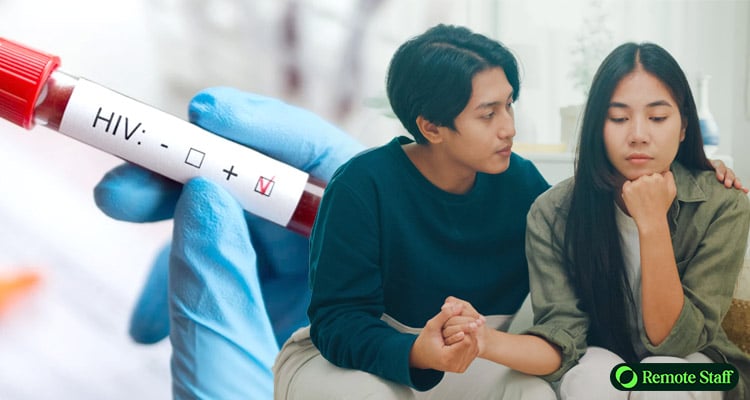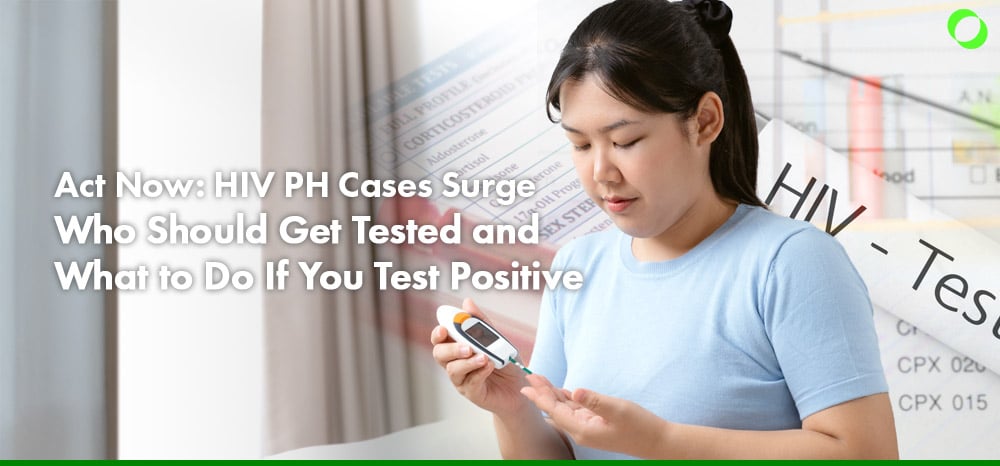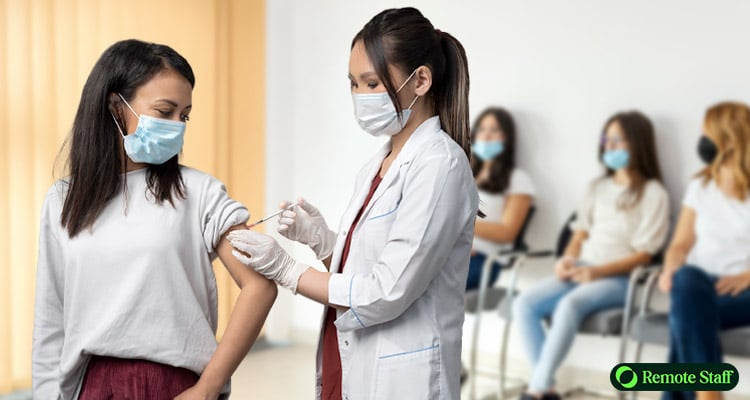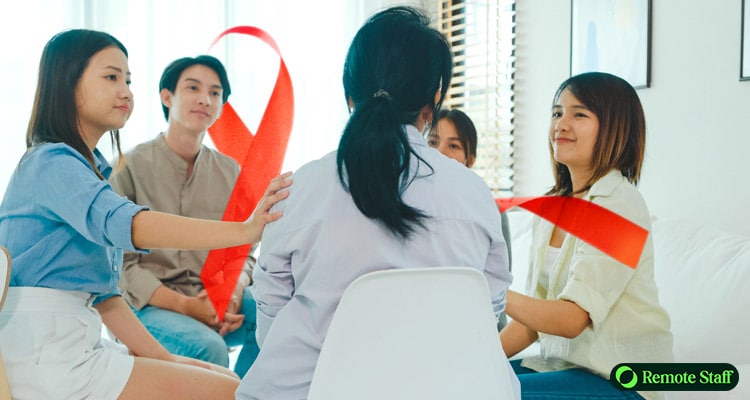There’s been an HIV infection rise on the news recently, especially among young people and busy professionals.
Recent reports show a sharp increase in new cases, with many coming from individuals in their teens to early 30s.
Why the sudden spike? Many think, “It can’t happen to me,” but the truth is, casual hookups and the prevalence of dating apps have made exposure more common than you might expect.
The good news? HIV is treatable and manageable. However, catching it early makes a big difference—which is why getting tested now is more important than ever.
Why HIV Deserves Your Attention—Yes, Even as a Busy Young Professional
Even with everything on your plate—work, social life, and personal goals—it’s important to take care of your health.
Right now, young adults and professionals make up the largest group of new HIV cases. That means the risk is closer to home than many think.
The Role of Casual Relationships and Dating Apps
Hookups, dating apps, and spontaneous trips are part of today’s fast-paced lifestyle—especially for young professionals. Meeting new people has never been easier.
With more connections, however, comes increased risk.
Even if it feels casual or low-risk, HIV doesn’t consider how responsible or careful you think you are. It only takes one unprotected encounter to get infected.
Many believe, “It won’t happen to me”—especially if they’re educated, selective, or usually play it safe. The truth is, HIV doesn’t target a certain “type” of person.
This isn’t about fear—it’s about awareness. Regular testing is a smart, responsible habit that fits your lifestyle.
It helps protect your health without putting your life on pause.
Who Should Get Tested for HIV?
You don’t need to wait until you feel sick to get tested.
HIV testing is a smart and responsible way to stay in control of your health—especially now that HIV infection rates are rising, particularly among younger adults and busy professionals.
Getting tested supports HIV early detection, which gives you a head start on treatment and helps protect others, too.
When caught early, HIV is highly manageable, allowing you to live a full and healthy life.
But What If You Feel Fine?
It’s a common misconception that you’ll notice symptoms right away.
However, the truth is, HIV exposure symptoms don’t always show up—or can be so mild that they go unnoticed.
Some may have mild, flu-like symptoms 2 to 4 weeks after exposure, such as:
- Fever
- Fatigue
- Sore throat
- Swollen lymph nodes
- Skin rash
Because these signs are easy to dismiss—or may not appear at all—regular testing is the only reliable way to know your status.
So, Who Should Be Getting Tested?
According to healthcare professionals, these are the groups that should get tested often.
Anyone With New or Multiple Partners
If you’ve recently started seeing someone new—or you’re dating more than one person—regular testing is important.
Even if everyone seems healthy, HIV can go unnoticed for months or even years without symptoms.
Condomless Sex (Even With One Partner)
Condoms greatly reduce the risk of HIV. If you’ve had sex without one, even in a committed relationship, you should get tested.
Partners may not always know their status or may have had previous exposure.
People Who Inject or Share Needles
Sharing needles, syringes, or any injecting equipment increases the risk of HIV transmission.
If you’ve ever injected drugs or substances, testing is strongly recommended—no matter how long ago it was.
LGBTQ+ Individuals, Especially Men Who Have Sex With Men (MSM)
HIV can affect anyone, but some groups face a higher chance of exposure based on patterns seen in health data—not personal choices or identity.
Men who have sex with men are encouraged to get tested regularly, especially if they’re sexually active.
Testing is a smart way to look after your health and the well-being of your partners.
Pregnant Women or Those Planning to Conceive
HIV testing is part of routine prenatal care in many places for a reason.
Knowing your status before or during pregnancy allows for treatment that can protect both you and your baby from transmission.
Where and How to Get Tested in the Philippines
Getting tested for HIV in the Philippines is simple and affordable.
Whether you’re being careful, curious, or just want peace of mind, there are free and low-cost clinics that offer confidential testing—no pressure, no judgment.
Results are kept confidential. Some hubs even use private IDs—you might only be called by your birthday or code, not your name .
Free & Low‑Cost Testing Centers
You don’t have to break the bank—or your schedule—to get tested.
Many clinics in the Philippines offer free or low-cost HIV lab testing, counseling, and treatment services.
Here are some of the most accessible options:
Love Yourself
Non-profit with a growing network (22+ centers nationwide, including stations in Metro Manila, Cavite, Cebu, Bacolod, Baguio) that offers free and confidential HIV/STI screenings, counseling, and condoms.
These are the clinic locations.
Government Clinics / Social Hygiene Clinics
Many local health offices and municipal social hygiene clinics offer free HIV testing, such as the Marikina City Health Office and various QC clinics.
Check out some of these hygiene clinics in Metro Manila.
Accredited OHAT Providers
The Outpatient HIV/AIDS Treatment (OHAT) Program is a government initiative under the Department of Health (DOH) that provides free antiretroviral treatment (ART) and ongoing HIV care to people living with HIV.
OHAT-accredited facilities are usually found in public hospitals, social hygiene clinics, and local health centers across the country.
Here’s a list of accredited OHAT providers in the Philippines.
How to book a test (walk-in, online, mobile apps)
Walk-in:
Many clinics, like LoveYourself and local health centers, accept walk-ins. Just check their hours before you go.
Online:
You can book a test through websites or social media pages. LoveYourself, for example, lets you set an appointment online in just a few clicks.
Mobile Apps & Home Kits:
Some groups offer free self-testing kits you can order online and take at home. Others have mobile testing services that go to different communities.
No matter how you book, the process is quick, easy, and discreet.
What to expect during your HIV screening
If it’s your first time getting tested, you might feel unsure about what will happen—but the process is simple, quick, and supportive from start to finish.
- Pre-test counseling: You’ll begin with a session led by trained professionals offering HIV counseling services. They’ll talk to you about your concerns, explain how the test works, and answer any questions.
- Sample collection: Most tests involve a quick finger prick to collect a small blood sample.
- Short wait time: Results are typically ready in 15 to 30 minutes.
- Post-test counseling: Whatever your result, you’ll get clear advice on what to do next—like prevention tips or treatment options. If you test positive, HIV emotional support is available to help you cope better.
Rest assured, your results are 100% confidential. Testing is handled with care and respect—it’s all about supporting your health, not judging your choices.
Getting tested doesn’t mean you’re reckless. It means you’re responsible.

I Tested Positive—What Now?
First of all, take a deep breath. Testing positive for HIV can feel overwhelming, but you’re not alone—and it’s not the end of your story.
With the right support and treatment, you can still live a full, healthy life.
Understanding the results: reactive vs confirmatory
A reactive result means the initial screening test detected possible signs of HIV. This doesn’t confirm a diagnosis yet.
That’s where HIV follow-up testing comes in—a confirmatory lab test is needed to be sure.
Healthcare providers will guide you through the next steps, offering support and care every step of the way.
What Happens After Diagnosis: Understanding the Stages of HIV
If your diagnosis is confirmed, it’s helpful to understand HIV infection staging—how the virus progresses over time.
Early detection and treatment can stop it from advancing and help you live a long, healthy life.
- Acute HIV infection – This is the first stage, occurring 2 to 4 weeks after exposure. Some people experience flu-like symptoms, while others may feel fine.
- Chronic HIV infection (asymptomatic stage) – The virus is still active but reproduces at low levels. You may feel perfectly healthy during this time.
- Symptomatic HIV (or AIDS) – Without treatment, HIV weakens your immune system over time, leading to serious infections or illnesses.
Catching HIV in the early stages allows for timely treatment and better health outcomes—often preventing the virus from ever reaching advanced stages.
Starting ART (Antiretroviral Therapy) right away
If the confirmatory test is positive, it’s best to start Antiretroviral Therapy (ART) right away.
These daily medications help keep the virus under control, protect your immune system, and let you live a full, active life.
The key is sticking to your treatment—HIV treatment adherence plays a huge role in how well the meds work over time.
With consistent ART, your viral load can become so low it’s undetectable—which means you can’t pass the virus on and may even test negative on some viral load tests.
Where to access free HIV treatment in PH
You can get free treatment through OHAT-accredited facilities across the country.
These include government hospitals, local health centers, and partner clinics like LoveYourself. They provide ART, regular checkups, lab testing, and even morale support.
View the list of OHAT-accredited providers here.
Talking to your partner(s): why and how to disclose safely
Letting your partner(s) know is an important step in protecting both your health and theirs.
HIV partner notification may not be easy, but you don’t have to go through it alone.
There are trained counselors who can help guide the conversation with care and support.
Can you still live a normal life? Absolutely.
Yes, you can thrive. With treatment, people living with HIV can work, date, travel, and even raise families.
Staying on ART can reduce your viral load to undetectable levels—meaning you can’t pass it on to others. (Undetectable = Untransmittable)
You are more than your diagnosis. With early action, good care, and support, you’re in control of your health and future.
How to Reduce Your Risk and Take Control of Your Sexual Health
Protecting yourself from HIV doesn’t have to be complicated.
With the right tools and habits, you can enjoy your relationships while staying in control of your health.
Consistent Condom Use
Using condoms every time you have sex is still one of the most effective ways to prevent HIV and other STIs.
Keep a supply handy, and don’t be afraid to talk about it with your partner—it’s all about mutual respect and safety.
PrEP: Extra Protection That Works
Pre-exposure prophylaxis (PrEP) is a daily pill that can reduce your risk of getting HIV by up to 99% when taken as prescribed.
It’s available in the Philippines through select clinics and government programs.
If you’re at higher risk, talk to a healthcare provider to see if PrEP is right for you.
Regular Checkups and Open Conversations
Make HIV medical consultations part of your normal healthcare routine—early advice from a doctor can make a big difference.
A routine HIV physical exam can also help catch any health concerns early, even if you feel completely fine.
Before starting a new relationship—or even a casual encounter—talk openly about STIs and testing.
It might feel awkward at first, but taking these steps shows care, builds trust, and helps protect both you and your partner.
Don’t Fall for Hookup Myths
There are plenty of myths that can make people underestimate the risk of HIV:
“They look clean and healthy, so they’re probably safe.”
HIV doesn’t have visible symptoms in its early stages—you can’t tell by someone’s outward appearance alone.
“It was just a one-time thing.”
Exposure can happen in a single encounter. One moment is all it takes.
“I’m not part of a high-risk group.”
HIV doesn’t target specific types of people. It’s about behavior, not identity.
“If they had HIV, they would have told me.”
Many people don’t know their own status, and some may be afraid to talk about it.
“I’d know if I had it—I’d feel sick.”
Early HIV infection often has no symptoms or symptoms that are easy to dismiss.
With HIV cases still surrounded by myths, knowing the facts and where to access free treatment in the Philippines can protect your health and your future.
Breaking the Stigma: Why Talking About HIV Saves Lives
HIV isn’t just a medical issue—it’s a social one too. One of the biggest barriers to testing and treatment is stigma.
By opening up the conversation, especially within your circles, you help save lives and create a culture of care, not fear.
HIV is a health condition, not a moral issue
HIV doesn’t define a person’s worth, values, or lifestyle. It’s a manageable health condition, just like diabetes or hypertension.
The more we treat it like any other health issue, the more people will feel safe getting tested and treated without shame.
How educated yuppies can help normalize testing
Young professionals have a unique influence. Talking about HIV testing as a normal part of your wellness routine helps break the silence.
Sharing your experience or casually encouraging a friend to get tested can make a big impact.
The Role of Inclusive Workplaces and Safe Spaces
Help build a work culture that supports health without judgment—by encouraging wellness programs, respecting privacy, and being open to conversations about HIV and other health issues.
Creating this kind of environment makes it easier for everyone to take care of their well-being without fear or stigma.
Real stories—whether told anonymously or openly—can be incredibly powerful.
Organizations like LoveYourself, Positibong Pinoy, and other local groups offer community, support, and a safe space to speak up.
Even just listening can make a difference—someone else’s story might be exactly what you need to feel seen.
Also, if you’re ready, opening up about your own experience could be the support someone else is looking for.
FAQ: HIV Testing for Young Professionals in the Philippines
Here are some common questions—and honest answers—to help ease your mind and encourage smart choices free of the stigma.
Is HIV testing painful or awkward?
Not at all. Most tests involve a quick finger prick or small blood sample.
You’ll be guided by trained counselors in a private, respectful setting. It’s fast, confidential, and over before you know it.
Will my employer or family find out?
No. Your results are strictly confidential.
Clinics handle all HIV cases with care and are legally required to protect your privacy.
Results are never shared with employers, family, or anyone else without your permission.
Can I still date, marry, or have kids if I’m HIV-positive?
Yes, absolutely. With proper treatment (ART), people living with HIV can maintain healthy relationships, get married, and have HIV-negative children.
Modern treatment allows you to live a full life and protect your loved ones.
Do I need to get tested even if I feel healthy?
Yes. Many people with HIV don’t show symptoms for years. That’s why regular testing matters—even if you feel perfectly fine.
According to HIV testing age recommendations worldwide, sexually active people—regardless of age—should get tested regularly, especially if they have new or multiple partners.
It’s the only way to know your status early and get the care you need before any health issues arise.
Is HIV a death sentence? (Answer: NO)
Definitely not. HIV is now a manageable condition with proper treatment.
Thanks to antiretroviral therapy and ongoing immune system support, HIV-positive individuals can live long, healthy, and productive lives.
Be Proactive, Get Tested, and Take Charge of Your Health
HIV cases are rising, especially among young professionals. That’s why it’s smart to stay informed, get tested, and protect your health.
Knowing your status gives you power. Testing isn’t just for “other people”—it’s for anyone who values their well-being and wants to protect the people they care about.
With early treatment, you can live a long, healthy life.
So don’t wait—get tested early, know your status, and take control of your health.
For more updates on health, remote job opportunities, and empowering news for young professionals, check out the Remote Staff Blog.



